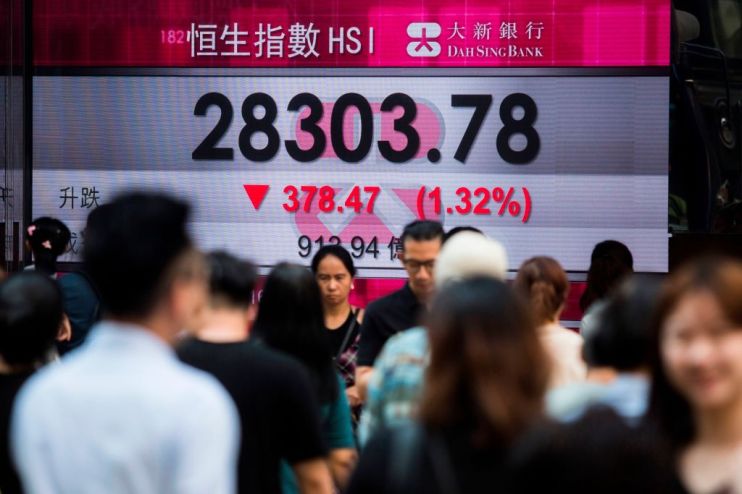Global stock markets spooked by Hong Kong and Argentina

Global investors are having a nervous morning as unrest in Hong Kong drags down Asian stocks and market turmoil shakes Argentina.
Read more: Asian stock markets fall as embattled Hong Kong leader urges calm
European stock markets have followed their Asian counterparts downwards. The German Dax index was 0.5 per cent down in early trading, the FTSE 100 had fallen 0.2 per cent, and the pan-European Euronext 100 had dropped 0.5 per cent.
Hong Kong’s Hang Seng index was 1.8 per cent down as it neared the close after another day of protests rocked the city. China’s SSE Composite index was 0.6 per cent lower, and Japan’s Nikkei closed down 1.1 per cent.
Hong Kong’s stock index has shed almost 10 per cent in a month as increasingly violent protests rage on in the semi-autonomous region.
“The Hang Seng has now fallen into negative territory for the year – one of the few equity markets to have done so,” said Deutsche Bank analysts in a note.
They said that on top of this, “poor data from China” and “signs of further trade war escalation” had “all combined to weigh on risk assets and drive another big move lower in rates”.
Emily Nicol of Daiwa Capital Markets said: “Events in bond markets have arguably been most notable, with further gains in the major markets.”
Yields on 10-year US government debt, known as Treasuries, had fallen 1.2 basis points (0.012 percentage points) to 1.637 per cent by 9am UK time. This shows investors buying up safe government debt as yields move inversely to prices.
Yields on 10-year Japanese government bonds also fell 1.5 basis points to minus 0.234 per cent, meaning investors lose money if they hold the bond to maturity.
Chaos in the Argeninian markets has also spooked investors. The country’s pro-market President Mauricio Macri was roundly beaten in a presidential primary yesterday by a populist rival which sent the country’s peso tumbling 15 per cent against the dollar.
Argentina’s Merval stock index plummeted 30 per cent and investors fled government bonds, leaving them trading at around 60 cents on the dollar.
William Jackson, chief emerging markets economist at Capital Economics, warned there could be spillover into other emerging markets after currencies fell yesterday.
“The falls in EM currencies… suggest that the South African rand, Turkish lira and many of those in Latin America will remain in the firing line,” Jackson said.
Read more: Argentine peso plunges versus dollar after shock election result
“We had argued before that a sovereign debt default in Argentina was more likely than not in the coming years, regardless of who won the presidential election. It now looks like default could come within a matter of months.”